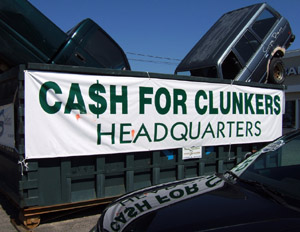
Call it the law of unintended consequences, or something you could have seen coming from a mile away, but vehicle donations to charitable organizations have dropped markedly, and the blame is being laid at the feet of the Cash For Clunkers program. Unlike a lot of car guys, I’m a big proponent of the CARS program. Most of the cars being turned in aren’t all that rare or lust worthy (my main, and other gearhead’s concern) and it gets older, less efficient cars off the road. And another upside is that it pumps more money into places like Michigan, Ohio and Indiana.
A drop in vehicle donations has been mentioned by several U.S. charities. For example, Volunteers of America, rely on donated vehicles as a main portion of their funding stream. Vehicle donations have been sliding since the start of the Cash For Clunkers deal started.
Since July 1, vehicle donations have fallen about 12 percent by and large, and could drop by as much as 25 percent. In real numbers, that’s around 175,000 vehicles heading to the Car Allowance Rebate System program (the official name for CfC) instead of going to charities.
Jim Hartman, vice president of vehicle donations at Volunteers of America, recently noted that “It varies by market, but there’s been an 11 to 12 percent drop compared with last year. The cars I’m seeing cashed in as clunkers, like older SUVs, are absolutely the typical donation to us.”
That makes sense. I used to live in Hawaii, and a car’s lifespan on The Islands is amazingly short. By consequence, vehicle donations were always high. Really, who’s going to buy a ten-year-old ride with rust holes big enough to put your hand through? Essentially no one, but you could always donate it to charity and get a little for it.
No doubt this will be just a temporary dip in donations for charities. Since the CfC program ended this past Monday (a victim of its own success), all those cars should soon be flowing back towards charities.
Source: LeftLaneNews
Photo fromFlickr user Tony the Misfit


A 501(c) organization that process donated cars, will accept a car whether it is running or not. Charities don’t really care about the condition of a car being donated. They even offer to tow inoperable cars for free.
In most cases, the donated car is sold as a package for a flat fee per car where the next step is a salvage yard. Not-for-profit organizations are not usually in the business of selling used cars. So, it is not in their best interest to try and resell the car to another consumer.
When the CARS program ends, neglected cars donated to charity will resume.
Charities are hurting, especially in a recession. Charity begins at home during times of low money, unemployment, etc. It’s unfortunate, but it makes a ton of sense. I was on a dealer’s lot the other day, and most of the clunkers that had been turned in were barely drivable. No charity would have wanted most of these vehicles anyway.